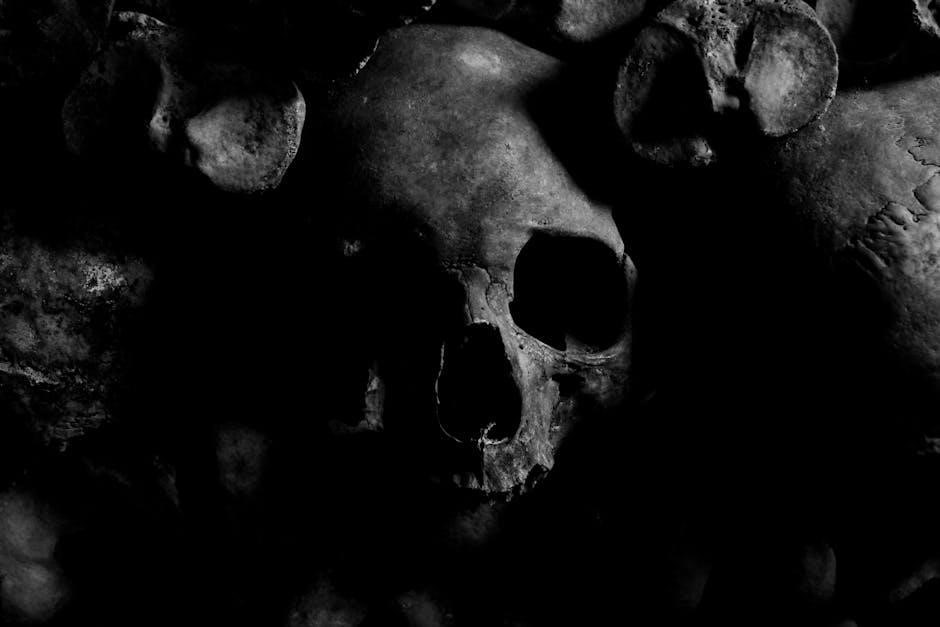Death and the King’s Horseman, a play by Wole Soyinka, explores Yoruba traditions, cultural clashes, and themes of duty versus desire, set in colonial Nigeria, highlighting the struggle between tradition and colonialism.
1.1 Overview of the Play
Death and the King’s Horseman by Wole Soyinka is a tragic play exploring Yoruba traditions, cultural identity, and colonial conflict. Set in 1940s Nigeria, it follows Elesin Oba, the king’s horseman, as he faces a moral dilemma between fulfilling his ritual duty and resisting colonial interference, highlighting the clash of cultures and personal sacrifice.
1.2 Cultural and Historical Context
Death and the King’s Horseman is set in 1940s Nigeria during British colonial rule, exploring the Yoruba people’s rich cultural traditions and the clash with colonial authority. The play reflects the tension between maintaining ancient rituals, such as the king’s horseman’s duty to die with his king, and the imposition of foreign values, highlighting the resilience of Yoruba identity amidst colonial disruption.
1.3 Themes and Symbolism
Death and the King’s Horseman explores themes of duty, honor, and cultural identity, contrasting Yoruba traditions with colonial interference. Ritual suicide symbolizes loyalty to the king and ancestors, while the clash of cultures highlights the tension between preserving heritage and adapting to external forces, reflecting deeper struggles of identity and autonomy.

Plot Summary
The play centers on Elesin Oba, the king’s horseman, who must ritually commit suicide following the king’s death. Set in 1943 colonial Nigeria, it explores his duty, cultural rituals, and clash with British authorities, highlighting the tension between tradition and colonial interference.
2.1 The Story of Elesin Oba
Elesin Oba, the king’s horseman, is tasked with ritually committing suicide to guide the deceased king to the afterlife. Set in 1943 during British colonial rule in Nigeria, his journey is disrupted by colonial authorities, highlighting the clash between tradition and colonialism. His personal desires and cultural duty conflict, creating a tragic dilemma.
2.2 The Role of the King’s Horseman
The king’s horseman, Elesin Oba, holds a sacred role in Yoruba tradition, tasked with guiding the deceased king to the afterlife through ritual suicide. This duty is both a personal honor and a spiritual obligation, ensuring the king’s safe passage. The role underscores the deep cultural significance of honor, loyalty, and ancestral traditions in Yoruba society.
2.3 The Clash of Cultures
The play vividly portrays the clash between Yoruba traditions and British colonial rule, as Elesin’s ritual suicide is disrupted by colonial authorities. This conflict symbolizes the broader struggle between indigenous customs and imposed foreign values, highlighting the tension between cultural preservation and colonial domination.

Themes and Symbolism
The play explores themes of duty, cultural identity, and the consequences of colonialism, using ritual suicide as a symbol of tradition’s clash with modernity and oppression.
3.1 Duty vs. Personal Desire
Elesin Oba embodies the conflict between duty and personal desire, as his obligation to ritually die for the king clashes with his longing for life and human connection, highlighting the tension between cultural responsibility and individual will in a colonized society.
3.2 The Significance of Ritual Suicide
Ritual suicide in the play symbolizes honor, loyalty, and the sacred duty to ensure the king’s safe passage to the afterlife, reflecting Yoruba beliefs in the continuity of life and the bridge between the living and the dead, while also highlighting the community’s spiritual and cultural values.
3.3 The Impact of Colonialism
Colonialism disrupts the sacred Yoruba tradition, as British authorities intervene to prevent Elesin’s ritual suicide, highlighting the clash between cultural preservation and foreign domination. This interference underscores the profound impact of colonial rule on indigenous practices and the tragedy of cultural erasure it perpetuates.

Character Analysis
Exploring Elesin, Iyaloja, and the Pilkings, the play delves into their roles, motivations, and cultural identities, revealing the emotional and societal complexities of their decisions and conflicts.
4.1 Elesin Oba: The King’s Horseman
Elesin Oba is the king’s horseman, burdened by the sacred duty of ritual suicide. His internal conflict between duty and desire drives the play’s tragic narrative, revealing the depth of cultural loyalty and personal struggle in a colonial setting. His character embodies the clash of tradition and external forces.
4.2 The Pilkings: Representing Colonial Authority
The Pilkings embody colonial authority, disrupting Elesin’s ritual suicide. Their interventions highlight the clash between British colonialism and Yoruba traditions, showcasing the tension between cultural preservation and oppressive external forces. Their actions symbolize the broader impact of colonial rule on indigenous practices and identities.
4.3 Iyaloja: The Mother Figure
Iyaloja, the mother figure, represents wisdom, strength, and cultural continuity. She supports Elesin, embodying traditional values and community cohesion. Her role underscores the importance of female leadership in preserving Yoruba customs, offering a counterpoint to colonial disruption and societal change.
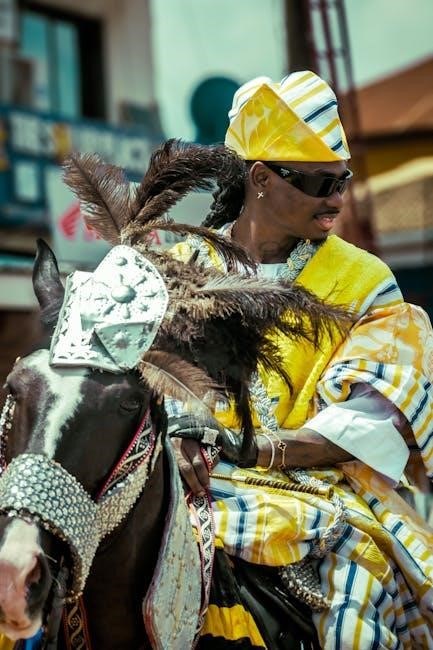
Real-Life Inspiration
The play is inspired by a real incident in colonial Nigeria during World War II, where the king’s horseman faced challenges fulfilling his ritual duty after the king’s death.
5.1 The Historical Incident
The play is inspired by a real incident in colonial Nigeria during World War II, where the death of a Yoruba king led to the horseman’s ritual suicide being interrupted by British authorities, sparking a cultural clash and highlighting the tension between tradition and colonial rule.
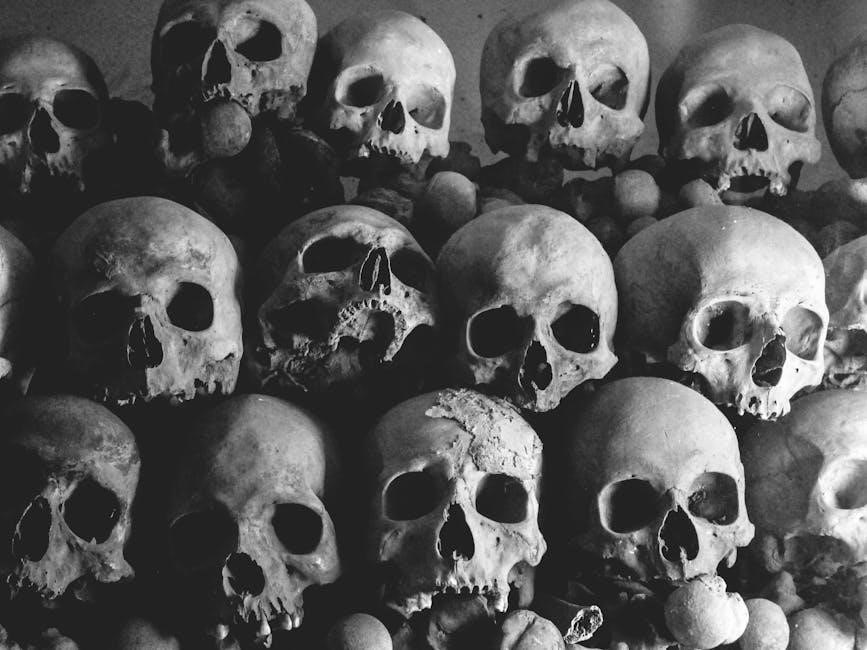
5.2 Soyinka’s Interpretation of Events
Wole Soyinka transforms the historical incident into a profound exploration of cultural identity, colonial conflict, and personal duty. His interpretation highlights the tension between Yoruba traditions and British colonial interference, using the event to critique the erosion of indigenous values and the complexities of cultural clashes during the colonial era.
5.3 The Play’s Connection to Yoruba Tradition
The play deeply reflects Yoruba cultural beliefs, emphasizing the importance of ritual, honor, and the afterlife. Soyinka portrays the sacred duty of the king’s horseman, highlighting the spiritual and communal significance of Elesin’s role in Yoruba tradition, while also exploring the tension between individual desire and collective responsibility.
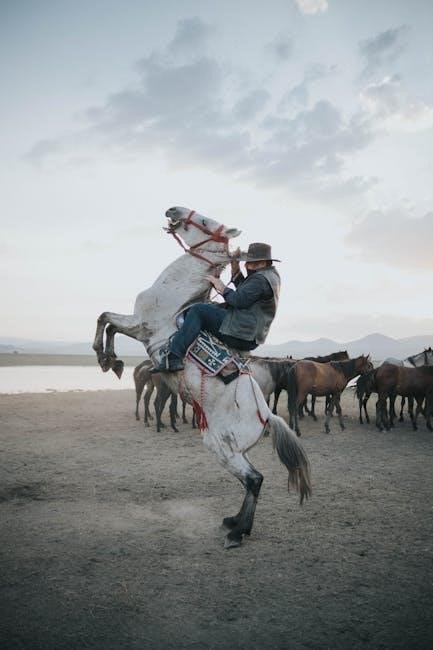
Critical Reception
Death and the King’s Horseman has received widespread acclaim for its profound exploration of cultural identity and colonial conflict, praised for its rich themes and emotional depth.
6.1 Initial Reaction to the Play
Death and the King’s Horseman initially sparked intense debate due to its bold portrayal of cultural conflict and colonialism. Critics praised its unique blend of traditional Yoruba elements with contemporary storytelling, while some found its themes provocative and politically charged, reflecting the tensions of its time.
6.2 Modern Interpretations and Reviews
Modern scholars and audiences continue to praise Death and the King’s Horseman for its profound exploration of cultural identity and colonialism. Reviews highlight its timeless relevance, blending traditional Yoruba elements with contemporary themes, making it a cornerstone of postcolonial literature and a powerful commentary on cross-cultural interactions.
6.3 The Play’s Legacy
Death and the King’s Horseman remains a seminal work in postcolonial literature, celebrated for its exploration of cultural identity and colonialism. Its enduring legacy lies in its ability to provoke thought on tradition, power, and identity, ensuring its relevance in contemporary discussions and academic studies worldwide.
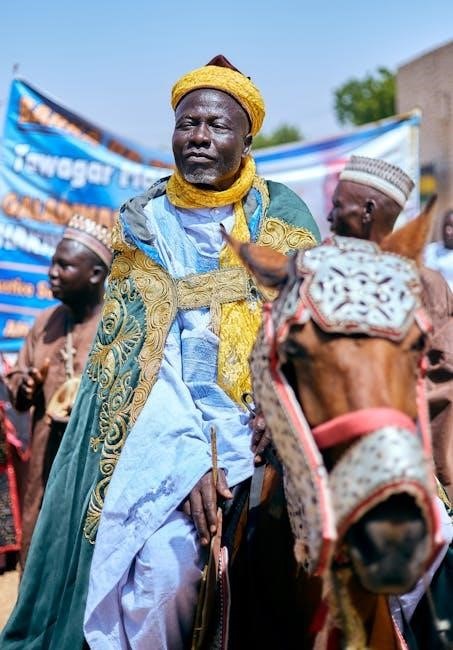
Adaptations and Interpretations
Death and the King’s Horseman has been adapted into films and stage productions, including a Netflix-backed version, showcasing its timeless appeal and cultural significance across global audiences and media.
7.1 Stage Productions
The play has been staged in various productions, notably directed by Tawiah MCarthy, blending traditional Yoruba elements with contemporary theater. These productions highlight the emotional depth and cultural richness of Soyinka’s work, attracting diverse audiences and scholars alike.
7.2 Film Adaptations
In 2022, a Netflix-backed film adaptation directed by Biyi Bandele brought the play to the screen, capturing the essence of Elesin Oba’s tragic journey during World War II. The film vividly portrays the cultural tensions and emotional depth of Soyinka’s narrative, resonating with global audiences.
7.3 Cultural Impact
Wole Soyinka’s play has profoundly influenced postcolonial narratives, bridging Yoruba traditions with global audiences. It sparks dialogues on cultural identity, resilience, and the clash of values, challenging colonial perspectives while celebrating African heritage, fostering cross-cultural understanding and appreciation for Nigeria’s rich traditions.
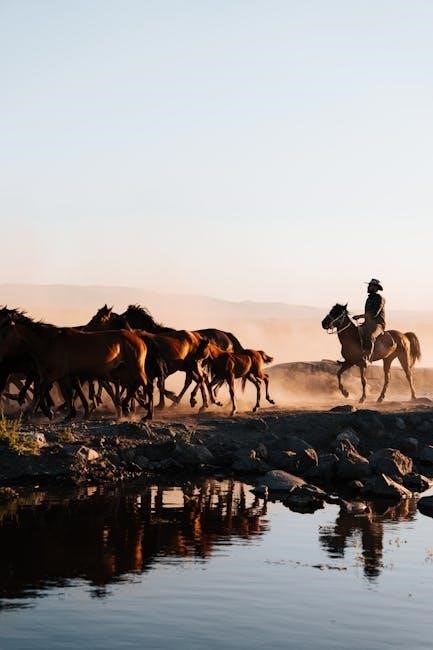
The Writing Process
Death and the King’s Horseman was written by Wole Soyinka in just two and a half days, blending traditional Yoruba elements with contemporary themes, inspired by real-life events.
8.1 Soyinka’s Creative Process
Wole Soyinka wrote Death and the King’s Horseman in just two and a half days, inspired by a real incident during World War II. The play blends traditional Yoruba theater with contemporary themes, reflecting Soyinka’s deep connection to his cultural roots and his ability to fuse history with artistic expression.
8.2 The Significance of the Play’s Structure
The play’s structure blends traditional Yoruba oral storytelling with modern dramatic techniques, creating a unique narrative flow. Its non-linear, poetic, and atmospheric design mirrors the cultural and emotional tensions, enhancing the tragic narrative and emphasizing the clash between tradition and colonial influence.
8.3 The Role of Language and Dialogue
Language and dialogue in the play preserve Yoruba traditions while contrasting with colonial influences. The rich, poetic exchanges reflect cultural identity, while the colonizers’ language underscores power dynamics. Dialogue drives the emotional depth, highlighting tensions between tradition and modernity, and emphasizes the clash of values central to the narrative.
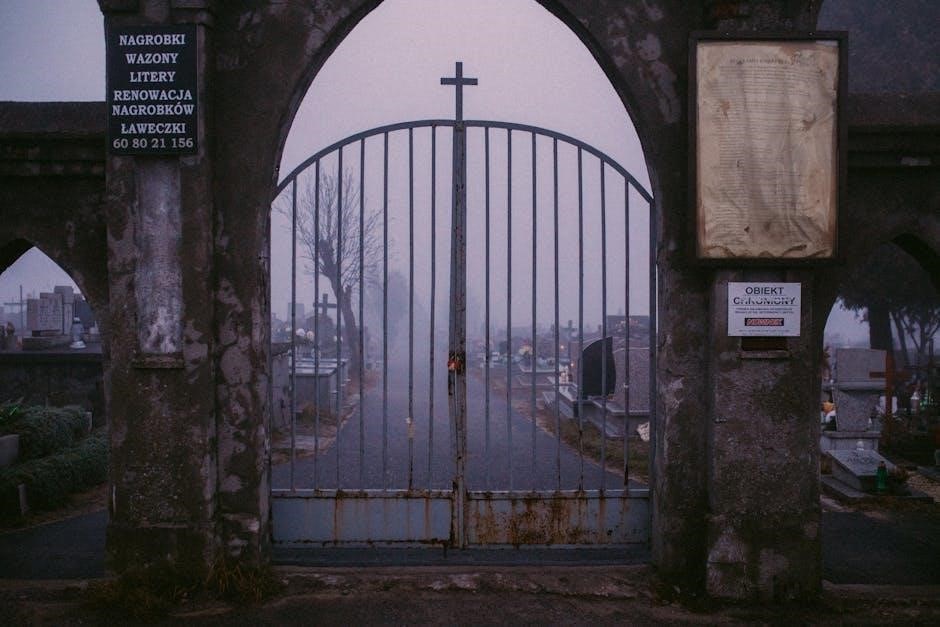
Resources for Further Reading
Access the PDF version of the play for a detailed read. Explore academic articles analyzing its themes and cultural significance. Discover reviews and interviews offering deeper insights into Soyinka’s masterpiece.
9.1 The PDF Version of the Play
The PDF version of Death and the King’s Horseman offers a convenient and accessible format to read Wole Soyinka’s masterpiece. Published in 2002, this edition includes the full play, allowing readers to explore themes of duty, culture, and colonialism in depth. It is widely available for download, making it a valuable resource for students and scholars.
9.2 Academic Articles and Analysis
Scholarly articles and analyses of Death and the King’s Horseman provide in-depth insights into its themes, cultural significance, and historical context. These resources, available in PDF format, explore Soyinka’s exploration of colonialism, ritual, and identity, offering critical perspectives for academic study and research.
9.3 Reviews and Interviews
Reviews and interviews about Death and the King’s Horseman offer insights into its cultural impact and Soyinka’s vision. Critics praise its exploration of colonialism and tradition, while interviews with Soyinka reveal his creative process and the play’s historical inspiration, enriching understanding of its themes and significance in African literature.
Wole Soyinka’s timeless masterpiece explores cultural identity and colonialism, offering profound reflections on tradition and power. This play remains a vital exploration in literature and theatre.
10.1 The Enduring Relevance of the Play
Wole Soyinka’s Death and the King’s Horseman remains a timeless exploration of cultural identity, colonialism, and universal themes. Its powerful narrative continues to resonate, offering insights into tradition, power dynamics, and the human condition, ensuring its relevance in contemporary discussions and studies.
10.2 Final Thoughts on “Death and the King’s Horseman”
Death and the King’s Horseman is a profound exploration of tradition, identity, and colonial disruption. Soyinka masterfully weaves Yoruba culture with universal themes, creating a timeless tragedy that bridges cultural divides. Its enduring relevance lies in its ability to provoke reflection on duty, heritage, and the human spirit’s resilience.
